Artisanal Gold Mining – Environmental Impact Reduction Activity (Oro Legal) Final Report
EXECUTIVE SUMMARY
The United States Agency for International Development’s (USAID’s) Artisanal Gold Mining – Environmental Impact Reduction Activity, or “Oro Legal,” was a bold response to the growing social conflict, environmental impact, and governance challenges arising from the most recent gold mining boom in Colombia. Oro Legal recognized that while illegal artisanal gold mining is the basis of illicit economies and drives environmental degradation — and threatens Colombia`s peace-building efforts, citizen security, and democratic governance — it also supports the livelihoods of more than half a million Colombian citizens. The timing of the Activity was apt as it sought to harness the growing awareness and action at all levels of government and increasingly by larger mining companies to create a shared agenda for change in this economically important yet much-maligned sector of the economy.
Oro Legal remains USAID’s largest and most ambitious bilateral initiative in support of artisanal and small gold mining (ASGM) and was implemented in two of Colombia’s emblematic mining departments — Antioquia and Chocó — between September 2015 and April 2021. The Activity grew out of the mining component of the Biodiversity – Reduced Emissions from Deforestation and Forest Degradation Program (BioREDD+), an earlier USAID initiative in Colombia that piloted innovative approaches to improve the social, economic, and environmental performance of small gold miners through legalization and formalization of operations and to mitigate environmental liabilities from past illegal mining.
The Oro Legal intervention strategy was initially underpinned by the conviction that better governance, leading to improved performance in the Colombian ASGM sector, would be brought about through the complex interplay of incentives and disincentives involving a broad array of stakeholders. The expectation was that this would lead to more assertive enforcement of mining, environmental, and other laws, as well as much-needed policy reform for an improved enabling environment, which when combined with high-quality technical assistance (TA) and training, would create tangible economic gains and other benefits for informal miners who became legal and formal, or who transitioned from mining to other livelihoods. The core strategy rested on effective participation between Oro Legal and a range of stakeholders from government, communities and their representative bodies, mining companies, and ASGM operators, as well as greater collaboration among themselves. A further premise was that as a USAID program, Oro Legal would be able to parley its “neutrality,” neither expanding nor limiting mining per se, but rather supporting responsible mining where it proved technically, financially, and legally feasible to do so, in concert with government of Colombia (GOC) counterparts and in alignment with prevailing policy. These core underpinnings were tested and evolved over more than five years of implementation, spanning two GOC administrations.
Oro Legal’s effectiveness and impact were due in large measure to its ability to play the role of a credible and trusted “honest broker.” The Activity was adept at convening stakeholders across groups who have historically had cool and sometime antagonistic relationships to discuss an agenda for change centered on broader, more holistic models around good governance and responsible mining. This extended to a change in attitude and greater involvement of several large mining companies that became committed to legalization of informal ASGM operators on their mining titles or claims, with improvements made in their productivity and environmental management, including the reduction and later elimination of the use of mercury.
Oro Legal´s strategy and interventions evolved in line with a results framework consisting of two objectives and six expected results that underlay higher-level project goals. The strategy also incorporated the then-prevailing USAID/Colombia Country Development Cooperation Strategy to consolidate Colombia’s peace process and contribute to environmental resiliency and improved natural resource management. One of the hallmarks of Oro Legal was a highly adaptive management approach, allowing the Activity to pivot in response to a shifting policy landscape and changing circumstances on the ground to broadly achieve its results, objectives, and goals.
Read more in the full report here.


